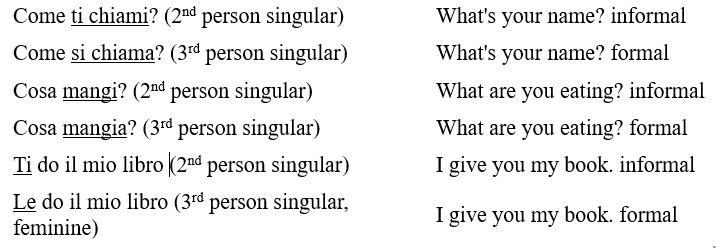TU vs LEI: how to avoid sounding rude in Italian!
Learning a language is not just about learning grammar, vocabulary, verbs etc., but it should also involve a good knowledge of the culture, traditions and social behaviour of that country. Talking to people in a socially acceptable, polite way is a big part of embracing a new language.
Unlike English, for example, Italian has 2 types of speeches depending on who you are talking to you: a formal speech (where you is translated as Lei) and an informal speech (where you is translated as tu).
It’s very important to know when to use TU and when to use LEI, to avoid sounding rude in a social or public environment, since using an inappropriate speech pattern could be an embarrassing situation to be in!
When should you use LEI (formal)?
Generally speaking, you should keep it formal when talking to elderly people, people you don’t know very well, important people etc.
Formal language is appropriate anytime you intend to be respectful towards the person you’re speaking to. A good example would be a work environment, especially when you’re talking to your boss, your line manager etc.
Whenever you feel like you should use Lei but you’re not 100% sure, it would be wiser to go with formal Italian, as it’s always the most polite option.
When should you use TU (informal)?
You should keep it informal when talking to children, friends, family, people you know well etc.
Informal Italian is also used in casual, informal environments, such as a friendly restaurants, shops or coffee shops, especially if the person you’re talking to (a sales assistant, a bartender etc.) appears to be as young as or younger than you. Another way of deciding whether to go formal or not, is to see how the person greets you first, and take it from there! For example, if you’re walking into a shop and the sales assistant welcomes you with ciao, you can definitely use tu, instead of Lei.
What’s the grammatical difference between Tu and Lei?
When using Lei (with capital L, not to be confused with lei, as in she/her), the verb in your sentence needs to be conjugated in the 3rd person singular.
For example:
Lei è una persona molto gentile! You are a very kind person! (formal)
When using Tu, the verb is conjugated in the 2nd person singular.
For example:
Tu sei sempre in ritardo! You are always late! (informal)
Take a look at the following examples, to better understand how the choice of the right ‘you’ in Italian affects verbs and pronouns:

Formal greetings vs informal greetings
Another important aspect of choosing formal or informal speech is the way you greet somebody, as some greetings are formal, whereas others are more informal, and some can be used in both situations!
If you’re in a formal environment or you’re greeting someone you don’t know (especially an elderly person), you could say:
- BUONGIORNO! (Hello, good morning) You would only use this when you arrive, daytime
- BUONASERA! (Good evening) You would only use this when you arrive, evening or night
- SALVE! (Hello) Very common, you would only use this when you arrive, anytime!
- ARRIVEDERCI! (Goodbye)
If you’re not sure whether it’s too late to say buongiorno or too early to say buonasera, go with SALVE (morning, afternoon or evening).
If you’re in an informal environment or you’re greeting a young person, or even not necessarily young but you feel like there’s no need to be too formal, you should always use the very popular
- CIAO! (Hello, hi, good morning, good evening, bye) As you can see, ‘ciao’ is a multifunctional word that can be used any time of the day, both when you arrive and when you leave.
- CI VEDIAMO / A PRESTO! (See you later) Only when you leave









